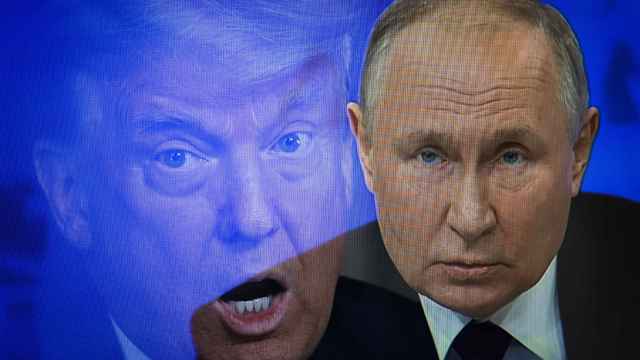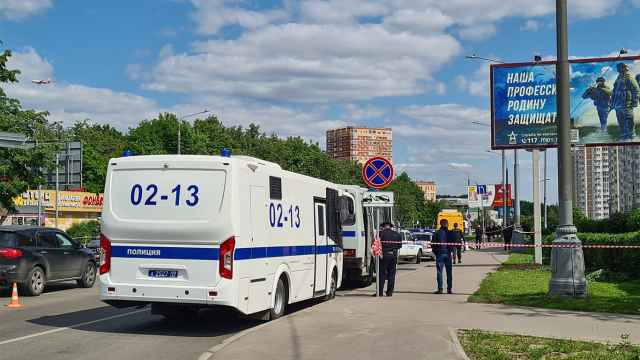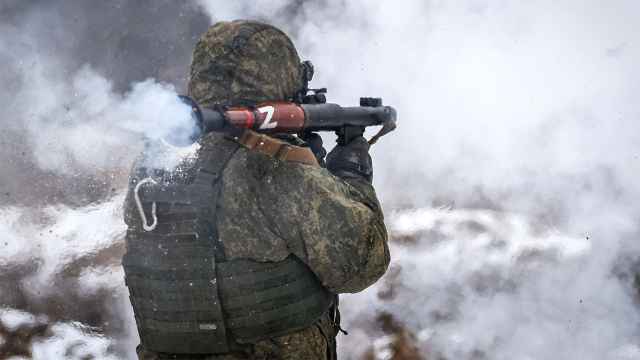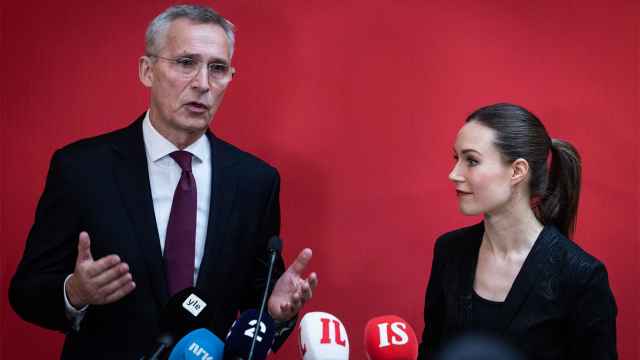The Kremlin is increasingly set on subjugating Ukraine by forcing a change in the country’s leadership as Moscow’s military efforts falter, five sources familiar with its thinking as well as independent experts told The Moscow Times.
But the longer it drags out peace talks on Ukraine, the more Russia risks losing U.S. President Donald Trump’s favor and missing a key window of opportunity to strike a bigger deal with Washington, sources said.
On Sunday, Trump told NBC News he was “very angry” and “pissed off” with President Vladimir Putin for attacking Ukrainian leader Volodymyr Zelensky’s credibility and calling for new leadership in Kyiv.
All of The Moscow Times’ sources spoke on condition of anonymity due to the sensitivity of the issue.
Despite U.S.-Russia talks on a negotiated peace in Ukraine and preparations for a Putin-Trump summit, the Kremlin continues to pursue its maximalist goals in the war.
Officially, the Kremlin envisions two possible scenarios for achieving its goals.
The first is Kyiv’s capitulation, leading to regime change and the restructuring of the Ukrainian state under Russian influence, effectively turning the country into a Belarus-like satellite.
The second, more modest, option would see Russia solidify its control over the four occupied Ukrainian regions while restricting Ukraine’s political and military independence.
But even this limited plan will be difficult to achieve, sources agreed. Russian forces have yet to establish full control over the occupied regions, and Zelensky is unlikely to agree to cede territory voluntarily. Instead, he continues to seek military and political support from allies in Brussels, London and Paris.
Moscow’s official and propaganda rhetoric remains unchanged.
“If you negotiate with Ukraine’s current leadership, you cannot keep calling it a ‘Nazi regime,’ because you would have to engage with that regime," a Russian diplomat said.
According to two Russian diplomats and a source close to the Kremlin, Moscow is now focusing on a third option: discrediting Zelensky in the eyes of Trump so that Washington will pressure Kyiv to hold presidential elections.
The sources claimed that Russian officials have already made progress in this effort, citing the Feb. 28 Oval Office clash as an example of their success.
Speaking aboard the nuclear submarine Arkhangelsk in the Murmansk region last week, Putin insisted that “democratic elections” in Ukraine could only take place under temporary external administration led by the UN and the U.S. — an extraordinary proposal with almost no historical precedent.
Russia’s nuclear submarine fleet is a key component of its “nuclear triad,” the strategic deterrence system inherited from the Soviet Union.
The visit to Murmansk was Putin’s second high-profile military appearance in a week, intended as signals to Kyiv and Western capitals.
“We’re toughening our rhetoric now so that our demands to Kyiv are heard and accepted,” a Russian diplomat told The Moscow Times.
The Kremlin believes Zelensky has a high chance of losing reelection and is intent on ensuring that outcome, with the hope that his successor will be more willing to compromise with Moscow.
“Zelensky will not agree to any territorial concessions. We need to address the root of the issue: Remove him,” said a source close to the Kremlin.
A senior Russian official familiar with Moscow’s foreign policy thinking echoed this view, calling the Ukrainian president’s departure a “successful and beneficial” outcome for Russia.
Ukraine has not held elections due to the martial law that it imposed following Russia’s full-scale invasion.
Putin has repeatedly claimed in recent months that Zelensky’s presidency is illegitimate, arguing that his term should have ended in May 2024.
And while he previously referred to the Ukrainian parliament speaker as a legitimate counterpart in contrast to Zelensky, he now calls the entire government in Kyiv illegitimate.
For his part, Zelensky has said he would step down if it meant that Ukraine would be admitted to NATO.
“Nachalnik [‘The Boss,’ a nickname for Putin among officials] has a personal dislike for Zelensky because he dared to publicly challenge him. One of our key goals is that Zelensky must no longer be in charge of Ukraine. That’s why we are systematically pushing the narrative of his illegitimacy and the need for elections,” a Russian diplomat said.
Moscow is also working to justify its position to the U.S. As The Moscow Times previously reported, the Russian Foreign Ministry has sought to blame Kyiv for violating a proposed 30-day partial ceasefire.
In doing so, Moscow hopes to convince Washington that Zelensky has lost control over his military.
“External administration is a sound initiative by the president because many institutions no longer obey the central government. Just look at Ukraine’s failure to uphold the ceasefire,” said Russian Senator Vladimir Dzhabarov, a former KGB officer. “Total chaos could erupt there soon, up to and including civil war.”
In reality, the ceasefire has yet to take effect, and both Kyiv and Moscow continue to trade strikes.
Dzhabarov also suggested that Putin’s proposal for external governance in Ukraine could gain support from the U.S., China and India.
“If the EU opposes it, Brussels may end up seriously damaging its relations with Washington,” he warned.
According to a Russian diplomat, Putin will refuse to make any concessions in peace negotiations as long as Zelensky remains in office.
“The hawks are dominating” the president’s inner circle, he noted.
“Even the smallest concession now would be seen as a gift not to Trump, but to Zelensky. That’s unacceptable to Putin,” the diplomat said.
Putin “acts in full accordance with Machiavelli’s advice — protect what’s yours, generously give away what isn’t. He’s ready to offer Canada and Greenland to Trump in exchange for Ukraine and Europe,” Boris Bondarev, a former Russian diplomat who resigned from Moscow’s UN mission in Geneva in protest of the invasion, told The Moscow Times.
The Kremlin understands it must offer Trump at least a symbolic gesture to maintain his interest. One such attempt was the renewal of the Black Sea grain deal, which the American side announced with a great deal of fanfare.
However, that effort failed, a Russian diplomat said.
“It’s not that important for Ukrainians, who already export their grain to the West. And to make it beneficial for us, Trump would have to pressure Europe into lifting sanctions — which is very difficult, if not impossible,” the diplomat said.
While Moscow still views itself as the stronger party, it remains unwilling to agree to a ceasefire — even in exchange for a potential deal with Trump.
This has put the Kremlin in a bind: unable to secure a military victory on the one hand, yet unwilling to compromise with Ukraine’s leadership on the other.
As a result, Moscow risks derailing negotiations and the warming of U.S.-Russia ties under Trump — and inadvertently re-uniting the West against Russia under his leadership.
“If we miss this window of opportunity, Trump won’t just lose interest in the deal — he could explode in anger. And then Biden will seem like a kind Santa Claus compared to an enraged Trump. I hope our leadership bears this in mind,” a source close to the Kremlin’s foreign policy team warned.
Speaking to NBC News on Sunday, Trump threatened to hit Moscow with secondary tariffs if the peace talks on Ukraine fall through.
“if Russia and I are unable to make a deal on stopping the bloodshed in Ukraine, and if I think it was Russia’s fault — which it might not be — but if I think it was Russia’s fault, I am going to put secondary tariffs on oil, on all oil coming out of Russia,” Trump said.
According to political analyst Georgy Bovt, Putin’s proposal for external governance in Ukraine signals that the Kremlin now seeks to cast the country as a failed state.
“But no UN external administration has ever been implemented on a truly failed state — not even attempted. And if Ukraine really is one, then it makes no sense to sign a ceasefire agreement with it either,” Bovt said of the logic behind Moscow’s position.
A Message from The Moscow Times:
Dear readers,
We are facing unprecedented challenges. Russia's Prosecutor General's Office has designated The Moscow Times as an "undesirable" organization, criminalizing our work and putting our staff at risk of prosecution. This follows our earlier unjust labeling as a "foreign agent."
These actions are direct attempts to silence independent journalism in Russia. The authorities claim our work "discredits the decisions of the Russian leadership." We see things differently: we strive to provide accurate, unbiased reporting on Russia.
We, the journalists of The Moscow Times, refuse to be silenced. But to continue our work, we need your help.
Your support, no matter how small, makes a world of difference. If you can, please support us monthly starting from just $2. It's quick to set up, and every contribution makes a significant impact.
By supporting The Moscow Times, you're defending open, independent journalism in the face of repression. Thank you for standing with us.
Remind me later.







